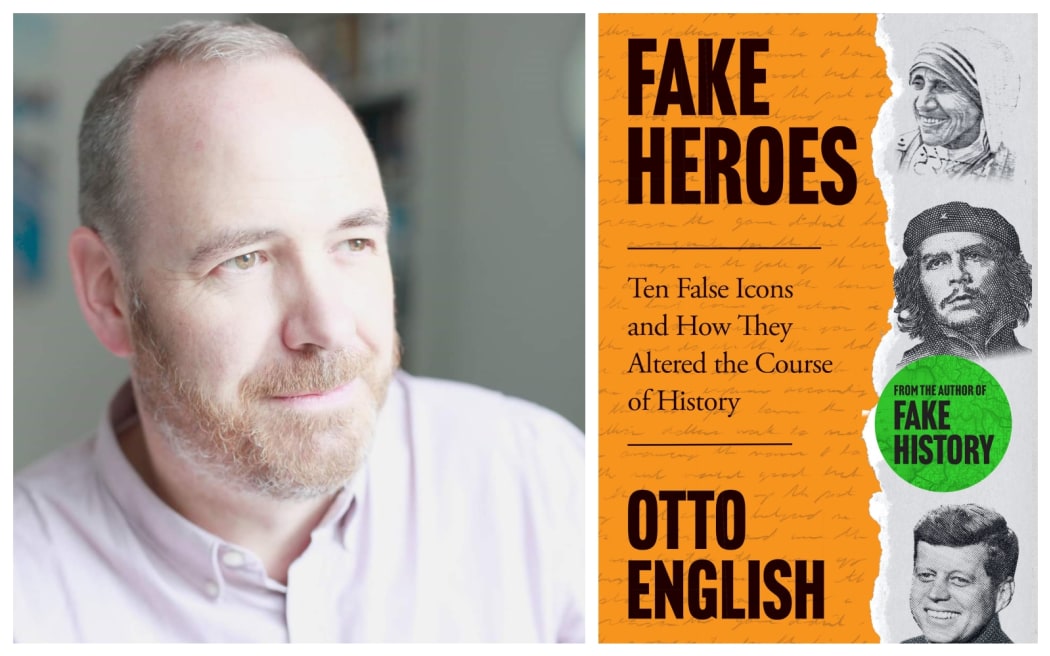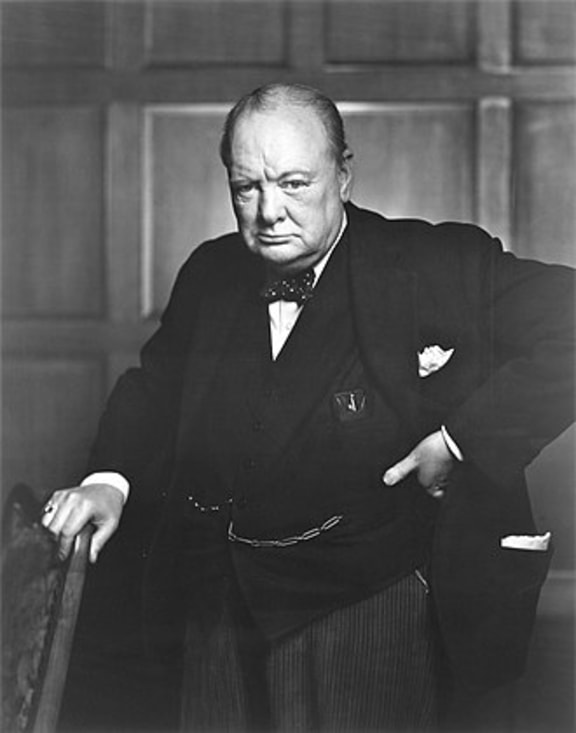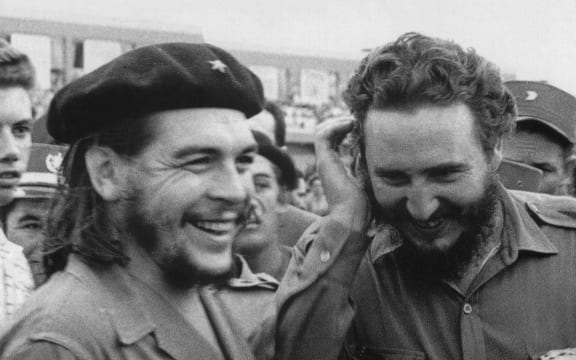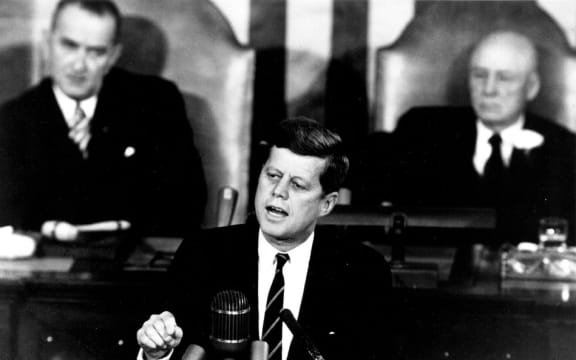A new book debunks many of the myths surrounding the heroes of history.
Andrew Scott is a political journalist who goes by the pen name of Otto English. His blog ‘The Pinprick’ covers history and politics, he’s also written two books on these same subjects.
His latest book is Fake Heroes: Ten False Icons and How they Altered the Course of History.
English examines these larger-than-life idols and exposes lesser-known truths.

Photo: Supplied
History is littered with fake heroes, English tells Jim Mora.
“An interesting thing happened with the first book, I found that, in the UK in particular, a certain group of people got very angry with me, because I wrote a chapter on Winston Churchill.”

Photo: Creative Commons
In it he debunked many stories of Churchill’s witty rejoinders.
“None of those comical stories people tell about Churchill, like when he was talking to a woman, supposedly and she said, ‘You're drunk, and he said, You're ugly, but in the morning, I'll be sober.’ Or the other one where somebody says, ‘You're completely impossible if I was married to you, I'd put poison in your tea.’ And he says; ‘And I’d drink it.’
“These are great stories, but Churchill never said either of those things, or many of the many things attributed to him. “
They were old vaudeville gags, English says.
“Even questioning things like that around the sacred figure, angered people in the UK.
“So, when I came to the second book, I thought I'll anger people to the power of 10!”
Che Guevara, whose beret clad image adorned a million student bedsits in the 70s, became the monster he was trying to slay, English says.
“The young Guevara who rode out of Argentina, on his motorbike in the 1950s and there's something really romantic and rather wonderful about that young man; he comes from a very privileged family and he sets off into his continent to try and find out what it's all about.”
The poverty and despair he found galvanised him, says English.
“And to his enormous credit, he decided that rather than just going home and moan about it, or write articles or books, he would actually set out to try and make the world a better place.
“And it's a huge ambition. And it's a remarkable thing for any young person to do. What's even more remarkable, is that along with the Castro brothers he did it.”
They overthrew the corrupt and repressive Batista regime in Cuba, and at this point Guevara could be described was a hero, he says.
"[The Batista regime] was one of the most egregious and terrible regimes even by the standards of its day, corrupt, evil, in bed with American gangsters, like a really nasty regime.
“But he then became the very monster that he set out to slay. And it's incredibly tragic what happened next.”

Cuban Prime Minister Fidel Castro. right, with Argentine guerrilla leader Ernesto Che Guevara in the 1960s. Photo: CUBA's COUNCIL OF STATE ARCHIVE / AFP
Guevara’s hero was the murderous Joseph Stalin, says English,
“At the very pivotal moment after Stalin had died when the Soviet Union itself was denouncing Stalin.
“He then went on to have these kangaroo courts, execute enemies of the state, and it got more and more out of control. He got more and more out of control. He wrecked almost single-handedly the Cuban economy, spent all the money that they'd inherited, then having upset and annoyed the Americans he upset and annoyed the Russians, the only lifeline Cuba had.”
Guervara was captured in Bolivia, where he was fighting with revolutionaries, in 1967 and executed.
John F Kennedy’s heroic status has only grown after his assassination ,says English, with much of the myths around him concocted after he was killed.
“In the popular imagination, we think of him as being almost a demigod, this sort of semi-divine figure, who had great dreams and hopes for his country, and he wanted to deliver them. But it really was not like that at all, that was a posthumous rewrite on events.”
The Camelot myth of the Kennedy administration was an elaborate tale spun by Jackie Kennedy after JFK’s death English says.
“In the week after Kennedy died she rang up a Life Magazine journalist and essentially said, come around for an interview.
“And she spun this huge, long story about how John F Kennedy loved the musical Camelot, some will have seen the film with Richard Harris.
"But it was originally a musical on Broadway with Richard Burton, the Welsh actor and Julie Andrews. And it was a huge hit on both sides of the Atlantic, actually on Broadway and in London.
“So, lots of people owned that record and so in a very smart way, almost like a kind of pre-internet viral sensation, she did this interview and quoted huge chunks of the libretto in the interview. If you read the interview, it's very peculiar.
“She keeps throwing in references to Camelot the musical and then quotes the last song, which is for one brief shining moment, there was a place called Camelot.”

What do the withheld 300 documents say about the JFK assassination Photo: Pixabay
From that one interview that the Camelot myth sprung, he says,
“She insisted that John F. Kennedy loved Camelot. But his secretary said that he hated it, never listened to it, and his favourite song was ‘Bill Bailey Will You Please Come Home’.
“So, when you are trying to write a myth about someone don't have some secretary who actually knows what went on and what your husband's favourite music choice was.”
Despite this, he believes on one level we need this kind of mythology.
“Wouldn't it be nice to believe this story of these extraordinary beautiful, ideological, people who just want to fling open the doors on a better world and make the world a better place and end the Cold War.
“Even thinking about it now that kind of has got the hairs on the back of my neck [up], because we want to believe in those people.
“We want to believe in those visions, and we want to believe that there are people out there who want to do it.”
The truth is more prosaic, he says.
“I'm not entirely convinced that Kennedy did want to do any of that. I think he, like a lot of people, it's the truth that dare not say its name. A lot of these people just want to be in charge, they want to be the head prefect.”
His book also throws the spotlight on some genuine, but relatively obscure, heroes.
“Wesley Autrey was a 52-year-old construction worker in New York and in January 2007, he was taking his two younger daughters across New York to their mother's house before he went on to work. And he was on the platform of the New York subway when a guy a younger young guy called Cameron Hollopeter had a some kind of seizure on the platform.
“He fell onto the tracks and Wesley Autrey who had never met this guy, never encountered him without any thought for himself, or his own safety or his life, leapt literally in front of a train that was coming into the station, grabbed this guy rolled them both into a drainage chute. And the train passed, I think, within an inch over the top of their heads and saved this guy's life.”
The extraordinary thing about the Wesley Autrey story, he says, is that he was a black American in his 50s from a working class background, who rescued a white movie film student who he’d never encountered before.
“It was deep, deep within him to behave heroically. And I'm afraid a lot of the fake heroes in my book, don't have an ounce of what Wesley Autrey had.”
Ian Gleed, a World War II RAF pilot, was braver than the much more feted Douglas Bader, he says.
“Even in the 1940s he was celebrated. But the reason many people haven't heard of him was Ian Gleed was gay, and for the British propaganda efforts of the war that didn't really fit the mould.
“So Gleed was quietly dropped post-war as one of our national heroes.”
Fake Heroes: Ten False Icons and How they Altered the Course of History is published by Welbeck Publishing.

